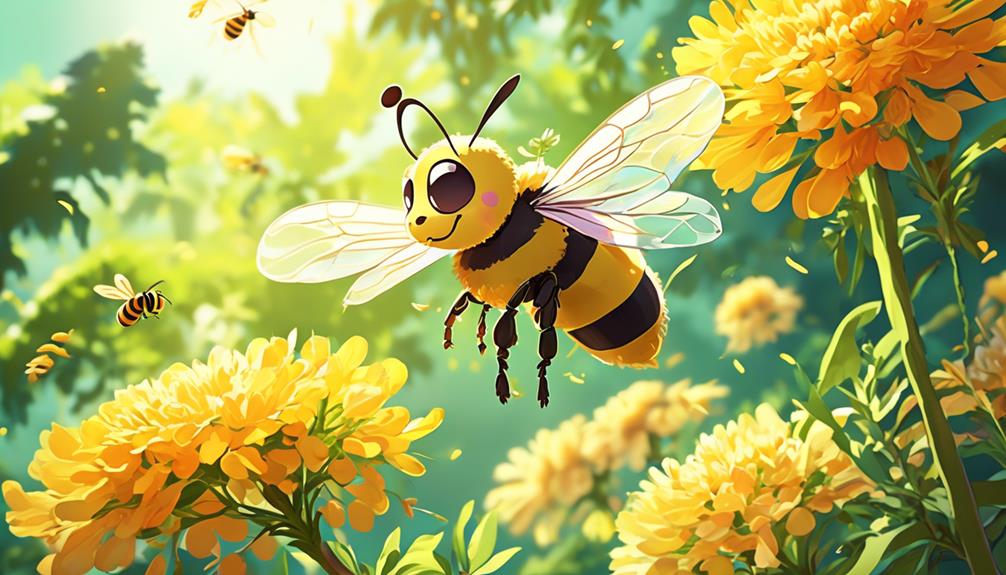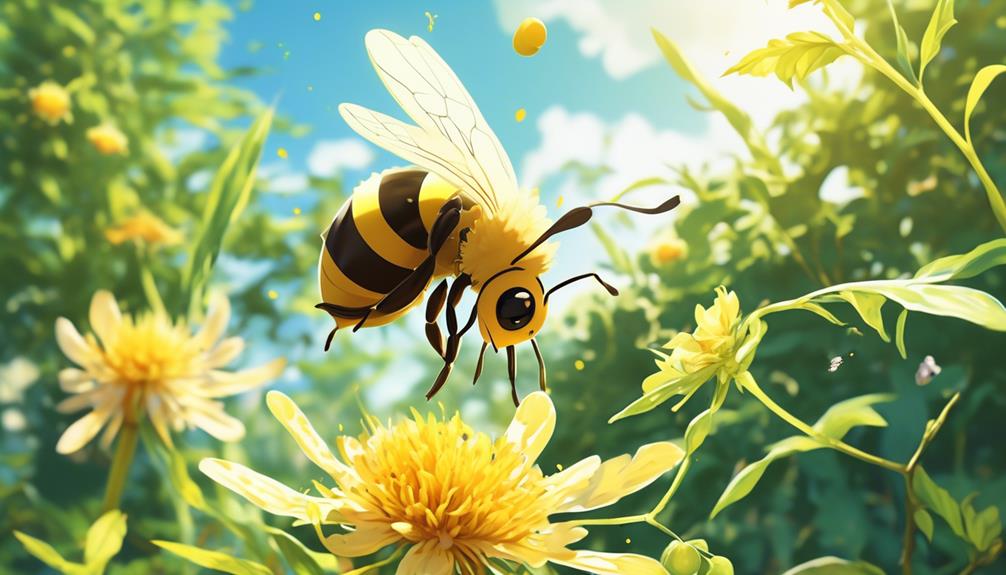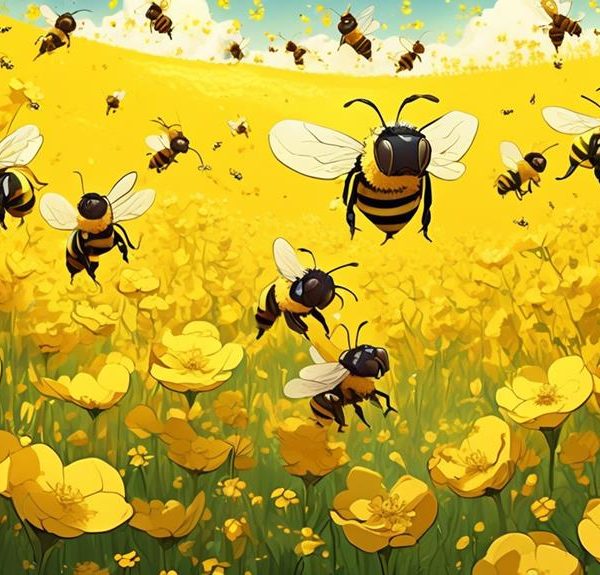Buzz into the world of bees to discover their intriguing relationship with citronella.

Do Bees Like Citronella?
Like a bee to honey, you're drawn to understanding the intricate world of these buzzing creatures. However, when it comes to citronella, things aren't so black and white.
You've probably heard citronella's renowned reputation as a natural insect repellant, warding off mosquitoes and other pests at your summer barbecues. But what about bees? Does the pungent aroma of citronella send them buzzing for the hills, or do they find it as enticing as a flower in full bloom?
We're about to embark on a journey into the sensory perception of bees to find out. Let's uncover the truth together, shall we?
Key Takeaways
- Citronella acts as a deterrent for bees without harming them.
- Bees avoid areas with citronella because its scent is overpowering and unpleasant to them.
- Citronella disrupts normal bee behaviors, making it difficult for them to return to their hives and find and gather nectar.
- Citronella candles confuse bees' olfactory senses, disorienting them and harming local bee populations.
Understanding Citronella

To truly grasp why bees might behave differently around citronella, you first need to understand what citronella actually is. Citronella is an essential oil that's derived from the leaves and stems of different species of Cymbopogon (lemongrass). You'll recognize its strong, distinctive citrusy, and somewhat woody scent that's commonly associated with outdoor candles and insect repellents.
But why does it matter to bees? It's all about the chemical composition. Citronella contains two primary components: citronellal and geraniol. These two compounds are known to have significant insecticidal properties. In the world of bees, these compounds can act as a deterrent, influencing their behavior and movement patterns.
Now, you might think if it's strong enough to deter insects, wouldn't it be harmful to bees? The answer is nuanced. While true that bees aren't exactly citronella's biggest fans, these compounds won't necessarily harm them. Instead, they're more likely to keep bees at bay, making it difficult for them to approach the source of the scent.
Understanding this dynamic is crucial if you're considering using citronella around bees. They aren't just important to our ecosystem, but they're also sensitive to their surroundings. Treat them with respect, and they'll do the same for you.
The Bee's Sensory Perception

Having understood how citronella affects bees, let's now explore how a bee's sensory perception plays a role in this interaction. Bees rely heavily on their sensory perception, using sight, smell, and even electromagnetic fields to navigate their environments and locate food sources. They possess complex olfactory systems, allowing them to detect and identify a vast array of chemical compounds within their environment.
Citronella's strong, lemon-like scent is unmistakable to bees. It's believed that this scent, while enjoyable to humans, is overpowering and unpleasant to bees' sensitive olfactory receptors. As a result, bees tend to avoid areas where citronella is present. This avoidance is likely a survival mechanism, steering them clear from potential harm.
In addition to their keen sense of smell, bees' vision also plays a part. They can see ultraviolet light, a spectrum of light invisible to humans. This UV vision guides them to nectar-rich flowers, which reflect UV light. However, citronella doesn't reflect UV light and therefore doesn't attract bees visually.
When considering the sensory perception of bees in relation to citronella, it's clear that bees' advanced olfactory and visual systems likely lead them to avoid citronella.
Citronella's Impact on Bees

When you're considering citronella's impact on bees, it's crucial to understand how this aromatic compound can disrupt their normal behaviors and potentially harm their populations. Citronella, a common ingredient in insect repellants and candles, is known for its strong, distinctive scent that's often used to ward off mosquitoes. However, this potent smell can also disorient bees, throwing off their navigation and foraging abilities.
Research has shown that bees exposed to citronella have difficulty returning to their hives, which can lead to population decline. Additionally, the aroma can interfere with their ability to locate and collect nectar, essentially limiting their food source. Here's a simplified breakdown:
Impact | Description |
|---|---|
Navigation | Citronella confuses bees, making it hard for them to return to their hives. |
Foraging | The strong scent interferes with bees' ability to find and gather nectar. |
In essence, while citronella may not directly harm bees physically, its indirect effects could contribute to the diminishing bee populations we're witnessing today. Therefore, it's worth considering alternative methods of insect repellent that are less disruptive to these vital pollinators.
Bees and Citronella Candles

In considering the relationship between bees and citronella candles, it's pivotal to note that these widely-used items can significantly disrupt bee behaviors and, consequently, their survival.
The scent emitted by citronella candles, while pleasant to humans and effective in repelling mosquitos, can be problematic for bees. Citronella, a strong-smelling plant oil, confuses bees' olfactory senses, making it difficult for them to locate and return to their hives.
This disorientation isn't just inconvenient; it can be fatal. If a bee can't find its way back to the hive, it can't contribute to the colony's food supply and may eventually die.
In your garden, you may think you're creating a peaceful, bug-free oasis with your citronella candles, but you could inadvertently be harming your local bee population.
Practical Implications for Beekeepers

As a beekeeper, you'll need to consider the potential harm citronella poses to your bee colonies, as it could significantly impair their foraging effectiveness and survival rates. Citronella, a key component in many insect repellents, could inadvertently serve as a deterrent to your bees, disrupting their scent trails and navigation abilities.
If you're using citronella products around your hives, it's crucial to reconsider. Bees rely heavily on their olfactory senses to locate flowers for nectar and pollen collection. Exposure to citronella can confuse these senses, leading to decreased foraging efficiency. This could result in lowered honey production and compromised colony health.
Moreover, evidence suggests that citronella could be toxic to bees, particularly at high concentrations. Chronic exposure might lead to increased bee mortality rates, threatening the sustainability of your apiary operations.
To mitigate these risks, consider alternative pest control methods such as essential oils from plants bees are known to favor. These can include lavender, thyme, or lemongrass. By doing so, you'll not only protect your bees, but also promote a healthier, more productive hive. It's a practical and sustainable approach, serving both your interests and those of your bees.
Citronella Alternatives for Pest Control

Understanding that citronella can potentially harm your bee populations, you might often find yourself seeking safer alternatives for pest control. The key is to identify solutions that are effective for repelling pests while posing minimal risk to bees.
Let's consider a few alternatives:
Alternative | Description |
|---|---|
Eucalyptus Oil | This natural oil repels many insects without harming bees. |
Lemongrass Oil | Similar to citronella but less harmful to bees. |
Cedarwood Oil | Effective against mosquitoes and safe for bees. |
Basil | Planting this herb can repel flies and mosquitoes. |
Mint | This plant's strong smell can deter many insects. |
Eucalyptus oil, for instance, is a natural deterrent for many pests but doesn't have the same negative impact on bees. Lemongrass oil, while similar to citronella, is considered less harmful to bees. Cedarwood oil is another effective deterrent, particularly against mosquitoes, and is safe for bees. Planting herbs like basil and mint can also deter pests with their strong smells.
When choosing a pest control alternative, it's not just about effectiveness but also about safety for all creatures involved. Always opt for options that don't harm beneficial insects like bees.
Frequently Asked Questions
Are There Specific Breeds of Bees That Are More Attracted to Citronella Than Others?
You're wondering if certain bee breeds show more attraction to citronella. It's not that simple.
Bees generally avoid citronella because it's a strong scent, often used as a natural insect repellant. While there could be slight variations in behavior among species, there's no evidence suggesting any particular breed is more attracted to citronella.
How Does the Smell of Citronella Affect the Bee's Ability to Find Their Way Back to Their Hive?
Citronella's strong scent can confuse bees' sense of direction. You see, bees rely on their olfactory senses to navigate. The overpowering aroma of citronella can mask the pheromones they use to find their way back to the hive.
It's not that they're attracted or repelled by it, it just muddles their 'scented GPS'. So, it's not beneficial for bees to be exposed to citronella if they need to return to their hive.
What Other Smells, Besides Citronella, Are Bees Known to Dislike or Avoid?
You're probably aware that bees are incredibly sensitive to scents. Besides citronella, they're also known to avoid the smell of bananas and crushed bee pheromones. In fact, if you've eaten a banana, it's best to avoid bees as the scent can agitate them.
The scent of crushed bees also signals danger to them, causing them to go on the defensive. Additionally, strong perfumes and other synthetic smells can deter bees.
How Does Citronella Affect Other Pollinators Like Butterflies and Hummingbirds?
You're wondering about citronella's impact on other pollinators, such as butterflies and hummingbirds. It's important to note that while citronella is known to repel certain insects, its effect on butterflies and hummingbirds hasn't been extensively studied.
However, given their sensitivity to strong scents, it's possible they might also avoid citronella.
More research is needed to fully understand the potential impacts.
Can the Use of Citronella in a Garden Have Long-Term Effects on the Local Bee Population?
Yes, citronella could potentially impact your local bee population over time.
It's not that bees particularly like or dislike citronella, but the strong scent can deter them from visiting your garden.
If you're consistently using citronella products, you're creating an environment that's less inviting for bees.
Over time, this could lead to a decrease in the local bee population as they move to areas with more attractive food sources.
Conclusion
In conclusion, you've seen that bees don't exactly favor citronella. Their sensory perception finds it disagreeable, causing them to avoid areas where it's prominent.
This could be a drawback if you're a beekeeper but a benefit if you're trying to deter pests. However, consider the ecological importance of bees and opt for alternatives when possible.
Remember, understanding the impact of citronella on bees is crucial in making informed decisions about its use.



